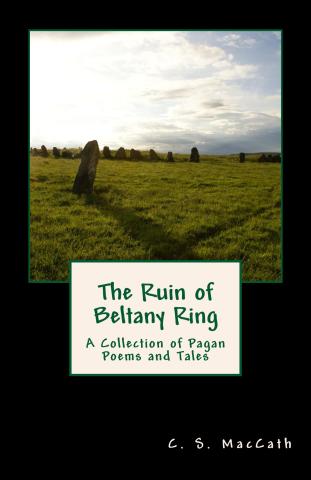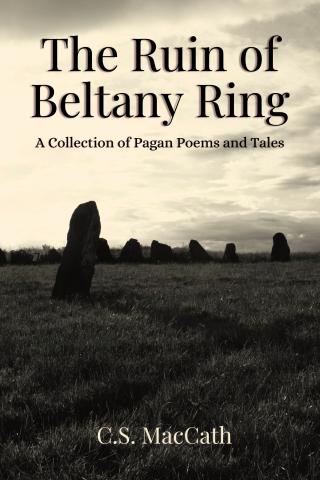This collection of poems and tales, spanning eight years of publication in Pagan and speculative fiction magazines and journals, includes award-nominated pieces that illuminate Pagan life and relationships with the sacred. Here there are Wiccan attorneys facing terrible dilemmas, Heathen priests bringing the good word of Woden to aliens, destructive fairies grieving for Detroit, and more.

The Ruin of Beltany Ring: A Collection of Pagan Poems and Tales
MacCath, C. S. 2013. The Ruin of Beltany Ring: A Collection of Pagan Poems and Tales. South Haven: Triskele Media Press.

The Ruin of Beltany Ring: A Collection of Pagan Poems and Tales
MacCath, C. S. 2025. The Ruin of Beltany Ring: A Collection of Pagan Poems and Tales. South Haven: Triskele Media Press.
...At a mere eighty-two pages, this collection ends much too soon. C.S. MacCath's short stories have a raw and almost visceral feel that hones directly into the travails and triumphs of everyday life, casting light onto the ways in which those living such lives might turn to Pagan spirituality to help guide them through their days. The poems, on the other hand, display a strange mixture of the seriousness of epic myth combined with a joyful willingness to play with those myths, and an angry undercurrent beneath it all, that sometimes rises to the fore in a bitter rage. As I noted before, this isn't really a collection of fantasy stories: The subtitle for the book is A Collection of Pagan Poems and Tales, and that is an entirely accurate description. One could almost think of this book as a Pagan prayer manual, offering a brief and engaging glimpse into the thinking of a member of the modern Pagan movement, and as that it is definitely a collection worth reading.
~ Aaron Pound at Dreaming About Other Worlds
Even after reading the glowing introduction, or maybe even because of it, this collection caught me off guard, wrapped a gnarled hand around my spine, and dragged me into itself. This is the word made magic, or magic made touchable. It is raw, and yet refined and rich, brutal and tender. It makes the soul remember. Each story, each poem, has a unique voice, and yet all speak to any who will listen. Evocative beyond explanation. What an amazing gift!
~ Chey Miller at Amazon.com
When modern readers think of pagan stories or poetry, they tend to first think of the writers and works of antiquity — Homer’s Iliad and Odyssey, Virgil’s Aeneid, Beowulf, the Poetic Eddas, the Táin Bó Cúailnge and Cath Maighe Tuireadh of Ireland. Pressed for more recent writers or titles, some might recall Gerald Gardner’s novel High Magic’s Aid, or The Twelve Maidens, by Stewart Farrar. Modern paganism has been gifted with an abundance of writers, but for the most part, the works they create are non-fiction books meant to educate, spread awareness, and introduce new spells, tools, and paths.
Thankfully, this is not the case with C. S. MacCath’s work, and I say “thankfully” because, while there is no shortage of books on paths, techniques, and the craft in pagan publishing, the world would be the less for this amazing collection of stories and poetry. Although I had never heard of the author before reading this book, I will be looking out for new work by her in the future. MacCath’s grasp of plot, characterization, and dialogue in the short stories shine like the first glimmer of sunlight after a thunderstorm, and the poems drew gasps, laughter, and tears alike from me with their soul-baring intensity.
The stories between these two covers — “Ink for the Dead,” “Ammonite Baby,” “From Our Minds to Yours,” “Yundah,” and the title story, “The Ruin of Beltany Ring” — include tales in the genres of contemporary mainstream fiction, science fiction (she has a gift for dystopian SF that makes me yearn in hope and shudder in horror simultaneously), and fantasy. Of these, my personal favorite is “Ink for the Dead”, the story that begins the volume, about a tattoo artist with a talent far beyond simply applying tattoo gun to flesh. The longest tale, “From Our Minds to Yours”, shows us a view from a window into a potential future that I hope like hell we never reach, but one we are, sadly, all too close to ending up at.
The poetry is just as magical, in every sense of the word. “Fetters” is a heart-wringing cry of grief for wrong roads taken and right ones unreachable; “A Path Without Bones” is a song and a question to the ancestors; “Two Servants of the Morrighan” describes how certain deities have no time for our bullshit, and “Στεφανοσ” is a blunt growl of impatient exasperation. These are poems so true and heartfelt it makes me wish I had written them myself, and I can’t think of any higher accolade to offer than that.
I often hear people say that they don’t like poetry, but on talking with them further and asking what sort of poetry they’ve read — and disliked so much — I usually find that what they really dislike is bad poetry, or boring poetry, or clumsy poetry, or poetry that doesn’t speak to anything they care about. Pagans afraid of reading poetry can read MacCath’s poems here without worrying about finding any of those unfortunate examples; there’s not a one that doesn’t soar and sing, and I wish her name were better known and her work more widely read.
I’ve re-read this collection three times since I originally got it; the first read-through happened during my down time at Pagan Spirit Gathering this year, and by the time I finished, I wanted to run up to random strangers, open to a poem or story at random, and growl, “Read this!” at them. Sanity prevailed, but I would still like to encourage — even demand — that everyone who has a chance to read these tiny marvels do so; it won’t be a waste of time.
~ Jennifer Lawrence at Eternal Haunted Summer
I happened to discover MacCath's writing almost by accident, and I'm so glad I did. This is a wonderful collection of stories and poetry that has hooked me as a fan; I'm eagerly following her writing career now. Definitely recommended.
~ Jolene Dawe at Amazon.com
...Yesterday I received and read The Ruin of Beltany Ring: A Collection of Pagan Poems and Tales, written by C. S. MacCath and published by Triskele Media Press (2013). My most favorite MacCath poem is included: “A Path Without Bones“. There is the pain of uprooting and transplanting, despair and coming to terms with irrevocable loss. I wonder what my father’s father’s ancestors felt when they had to leave off following the reindeer to till the ground, and eventually travel across the ocean to a new land. Leaving everything behind, including what you can’t live without, any more than you can breathe without the presence of air.
Good poems. Nice variety of mood and structure. The short stories also are interesting. The ones I enjoyed most were dystopian and apocalyptic, projecting current trends and portends into all too possible futures. They reflect many of my own concerns and increasingly frequent disturbing dreams.
...Anyway, The Ruin of Beltany Ring, which is both book title and lovely, haunting story, is well worth reading. By the end of the day I had read it twice through, and today I went back to taste the special passages again.
~ Liz Bennefeld at Patchwork Prose
I am happy to report that The Ruin of Beltany Ring is a wonderful, thoroughly engaging, always amazing anthology. Though familiar with a few of the works, most were new to me. I spent a happy few hours lost in magical worlds populated by seal-women, lame Gods, furious Goddesses, eco-warrior fairies, anima loci, and Wiccan lawyers. In "Ink for the Dead" a tattoo artist is guided by the whispers of spirits, while a man facing a life crisis dreams a possible future in "My Ammonite Baby." The spirit of a place speaks to a lost, sorrowful woman in "When I Arrived, This Is What She Said," while "Hephaestus" contemplates the many blows which made Him while he hammers metal into art. The stone ring of the title has its own age-old story to tell, while the unnamed narrator of "God-Touched" agonizes over the divide between human and divine.
MacCath has a real gift for crafting imagery.
~ Rebecca Buchanan at BookMusings: (Re)Discovering Pagan Literature
...I'm not particularly knowledgeable when it comes to Paganism but it turned out not to matter in the slightest as both the poetry and prose are beautifully written with rich, colourful language in a style that is for the most part easy to grasp and clearly comes straight from the author's heart.
I especially enjoyed the tales set in a not-too-distant future - a refreshing alternative to the apocalyptic/dystopian fiction I've read previous to this. 'Yundah' is a beautiful and soulful short story that I felt was the highlight of the stories.
I will be loaning the book to my Wiccan sister as I believe she'll get a lot out of this collection...but I'll be making sure that I get it back to re-read asap!
My mind has been opened to a genre I hadn't considered previously and I look forward to reading more works by the author...
~ Richard at Goodreads
The Ruin of Beltany Ring starts off with a beautiful, heartfelt forward by one of my favorite pagan authors, Deborah Blake. I am pleased to agree with her praise and thoroughly enjoyed the read.
Switching between poems and short stories, the author twists you up in one storyline before whisking you off to the next world, not giving you a chance to collect your scattered emotions. That is, if you read it all at once as I did my first read-through, unable to put it down. The stories are so unexpected, so honest and heartfelt yet unyielding. They could be told by anyone, they’re not exclusively pagan, except the threads of magic that run through each one.
I was most struck by the short story, “Ink of the Dead”. There is so much life in those words, and while the storyline itself isn’t pagan-centric, take those elements out and it’s just not the same.
There were a few formatting issues and misalignments, perhaps only in the .pdf version, but nothing that detracts from the spirit of this book. Highly recommended to read, more than once.
Five pawprints out of five.
~ Ser at Pagan Book Reviews